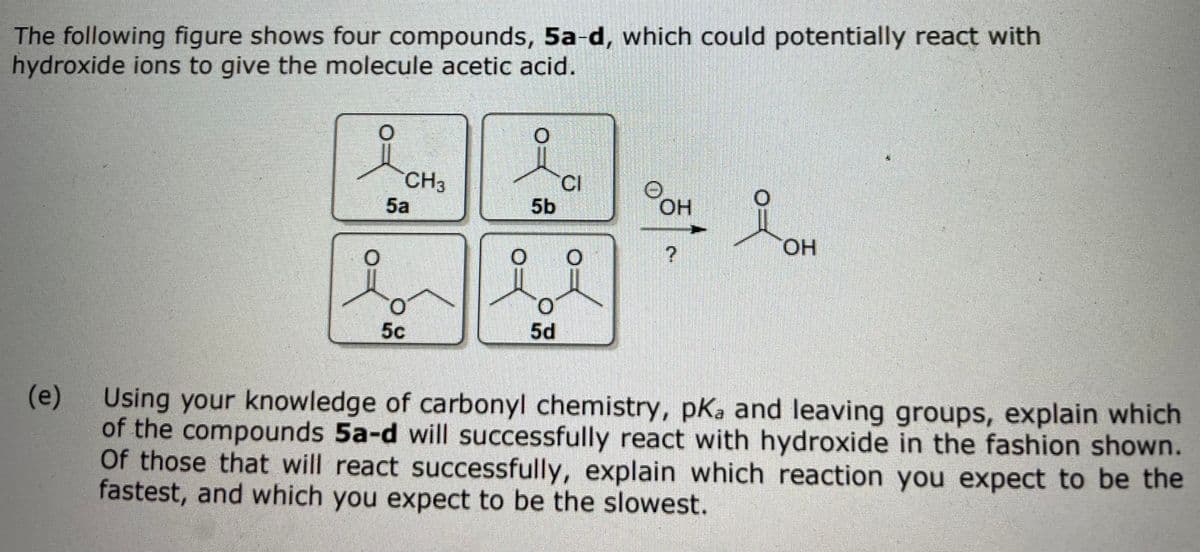The following figure shows four compounds, 5a-d, which could potentially react with hydroxide ions to give the molecule acetic acid. of CH3 5a OOH OH CI 5b HO, ? 5c 5d Using your knowledge of carbonyl chemistry, pKa and leaving groups, explain which of the compounds 5a-d will successfully react with hydroxide in the fashion shown. Of those that will react successfully, explain which reaction you expect to be the fastest, and which you expect to be the slowest. (e)
The following figure shows four compounds, 5a-d, which could potentially react with hydroxide ions to give the molecule acetic acid. of CH3 5a OOH OH CI 5b HO, ? 5c 5d Using your knowledge of carbonyl chemistry, pKa and leaving groups, explain which of the compounds 5a-d will successfully react with hydroxide in the fashion shown. Of those that will react successfully, explain which reaction you expect to be the fastest, and which you expect to be the slowest. (e)
Organic Chemistry
8th Edition
ISBN:9781305580350
Author:William H. Brown, Brent L. Iverson, Eric Anslyn, Christopher S. Foote
Publisher:William H. Brown, Brent L. Iverson, Eric Anslyn, Christopher S. Foote
Chapter9: Nucleophilic Substitution And Β-elimination
Section: Chapter Questions
Problem 9.27P
Related questions
Question
Which compounds from 5a-d will react with hydroxide in the fashion shown. Which reaction will be the fastest and slowest? Explain using knowledge of carbonyl chemistry, pka and leaving groups.

Transcribed Image Text:The following figure shows four compounds, 5a-d, which could potentially react with
hydroxide ions to give the molecule acetic acid.
CH3
CI
5b
5a
OH
HO.
5c
5d
(e)
Using your knowledge of carbonyl chemistry, pKa and leaving groups, explain which
of the compounds 5a-d will successfully react with hydroxide in the fashion shown.
Of those that will react successfully, explain which reaction you expect to be the
fastest, and which you expect to be the slowest.
Expert Solution
This question has been solved!
Explore an expertly crafted, step-by-step solution for a thorough understanding of key concepts.
Step by step
Solved in 2 steps with 1 images

Knowledge Booster
Learn more about
Need a deep-dive on the concept behind this application? Look no further. Learn more about this topic, chemistry and related others by exploring similar questions and additional content below.Recommended textbooks for you

Organic Chemistry
Chemistry
ISBN:
9781305580350
Author:
William H. Brown, Brent L. Iverson, Eric Anslyn, Christopher S. Foote
Publisher:
Cengage Learning


Organic Chemistry
Chemistry
ISBN:
9781305580350
Author:
William H. Brown, Brent L. Iverson, Eric Anslyn, Christopher S. Foote
Publisher:
Cengage Learning
